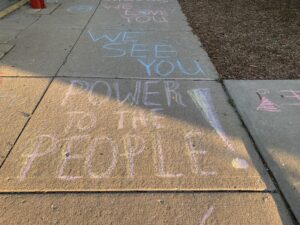What Does Trauma Have to Do with Dating?
According to the Substance Abuse and Mental Health Services Administration, 61% of men and 51% of women in the United States experience at least one traumatic event in their lifetime. Trauma is the result of experiencing a life-threatening and extremely powerful event. It can include but is not limited to surviving domestic violence (DV), natural disasters, medical trauma, crime, terrorism or sexual abuse. Regardless of the type of event, the end result for individuals who develop Post-traumatic stress disorder, or PTSD, can be full of fear, panic, and sometimes a lifetime of healing. This is because trauma changes not only the way our mind perceives the world but even our biological responses.
One of the most important aspects of supporting individuals who experience trauma is access to trauma-informed services. Trauma-informed refers to services that not only takes into consideration the impact of trauma, but also the understanding that trauma looks different for everyone. Being trauma-informed also brings other things into consideration, such as the types of questions asked to a survivor of trauma. To learn more details about trauma-informed care, feel free to click here.

So, what does trauma have to do with dating? Most of us would probably not associate trauma with dating after all dating is often seen as a normal, pleasurable, and socially acceptable part of the human experience. Yet, many of us also experience the dark side of dating, which includes DV, sexual assault, and other types of abuse. When these types of experiences occur, it becomes challenging to navigate the world of dating. People who experience these types of situations may have a difficult time connecting with others, trusting others, or engaging in intimacy. I want to clarify that these are normal responses and not the individual’s fault in any way. You see, when we experience traumatic situations such as these, our brains go into a protective mode designed to activate our defense system. This can include developing triggers which are small figurative “activation switches” that react when we re-experience stimuli that reminds us of these traumatic experiences. For example, a specific smell like a cologne or perfume can remind us of someone who caused us harm, and as a result, we shut down or react. This is commonly referred to as the fight/flight/or freeze response we experience when we perceive danger. This response usually occurs automatically and can look different for different people. Yet, the purpose of this response is the same for everyone, and these triggers tell our brain that something is not right or that we may be in danger. Relationship trauma can impact anyone, regardless of gender, sexuality, age, or race.

Signs That We Maybe Experiencing Dating Related Trauma
Many of the signs can be similar to common PTSD responses, yet when it comes specifically to dating, there are some signs that can help us better understand our experience. Some experts believe that dating related trauma that occurs after coming out of an abusive relationship should have its own label and have begun calling it “post-traumatic relationship syndrome.” It’s important to disclose that not all relationships need to include DV to be traumatic. Many people experience psychological abuse from partners that doesn’t leave a physical bruise, but instead a psychological one. The following are some of the signs that you may have been impacted by PTRS.
- Fear of starting a new relationship: it can be challenging to start a new relationship when we’ve experienced past abuse, whether it is physical, verbal, or sexual. The bottom line is that our ability to trust has been shattered and it takes time to rebuild. This is important to recognize because identifying our feelings and responses to relationship trauma is the first part of being trauma-informed dating.
- Feelings of Guilt: Guilt is a powerful feeling, and it can cause a variety of responses such as self-isolation, low self-esteem, feelings of shame, self-doubt, and anger. After all, guilt is rooted in the belief that we did something wrong. The truth is that survivors of abuse (verbal, physical, emotional, sexual, or psychological) are never at fault. It takes time, however, to heal and learn to navigate through the guilt. It’s important to seek support from trusted friends, family, and even a mental health provider.
3. Codependency: The unrealistic practice that requires us to give up our power to others is based on the fear of losing them and remaining alone. Codependency can happen in any relationship, whether it’s with a family member, friend, or partner. Traditionally codependency was associated with substance abuse and at its core described the often toxic relationship that occurred between addicts and loved ones who enabled substance use. It has in recent years, however, developed into a more complex and comprehensive view of toxic relationship patterns in general regardless of substance use.
The problem with codependency in relationships is that we often lose a sense of ourselves and our own needs. Codependency can often be a significant ingredient or result from relationship trauma. It can lead to ongoing unhealthy patterns and cause us to jump into other “toxic” relationships quickly. Codependency in relationships can occur in simple

ways such as apologizing continuously to an abusive partner for their actions. When we do this, we are inadvertently taking away responsibility from them and putting it on ourselves for the sake of maintaining the relationship or “keeping the peace.”
4. Flashbacks, Derealization, & Nightmares: Even long after we leave a toxic, abusive, and traumatic relationship, we can continue to experience after-effects. One of these effects are flashbacks which are often involuntary and reoccurring. Flashbacks can take us back to particular memories in those relationships and are often activated by triggers. Flashbacks can be visually intense and uncomfortable because they force us to re-experience the memory. Another is derealization which affects the way we see the world around us. Some people describe it as a dream-like state where things happen but feel unreal. This often occurs as the brain tries to gain control and protect us by disconnecting us from the painful and often discomforting feelings we are experiencing as a result of the traumatic experience. Finally, nightmares. We all know what nightmares are and we’ve all experienced them. However, when it comes to relationship trauma, these nightmares carry specific themes that can include abuse, lack of safety, memories of past relationships, stalking, being physically hurt, or being back in the relationship.
These are just a few of the ways in which relationship trauma can impact us. The most important aspect of being trauma-informed when it comes to dating is understanding how relationship trauma can impact individuals. If you experience or know someone who experiences these symptoms, it’s important to be empathetic and be mindful of the way we interact. Healing from trauma requires us to redevelop a sense of safety.
What To Do If You Are Experiencing Symptoms
Fortunately, there are a variety of resources available if you are currently experiencing abuse and/or if you have in the past. Below you will find some helpful resources/tips you can utilize.
If You Are Currently Experiencing Abuse
- 911 for immediate assistance
- National Domestic Violence Hotline at 1(800) 799-SAFE (7233)
- For teens who are experiencing dating violence, the National Teen Dating Abuse Helpline provides 24/7 support and resources at 1-866-331-9474 or via their live chat service.
- Women’sLaw.org provides legal information to help support women in domestic violence situations.
If You Have Experienced Abuse
- Seek mental health support such as therapy. There are many non-profits that provide low cost mental health services with or without insurance. You can also contact your insurance company and inquire about their mental health services. Another option is utilizing databases such as one of our partners www.latinxtherapy.com which has a wide array of bilingual Latinx therapists.
- Reach out to trusted friends who you can talk to or can support you.
References
Luis is a Licensed Marriage & Family Therapist who graduated from Long Beach State University with a Masters degree in Counseling Psychology (2015). He also has a Bachelors's degree in Child and Adolescent Development with an emphasis on Public Policy from San Francisco State University (2011). Luis has over 9 years of experience working with children and families both in education and mental health. Previously, Luis worked for a non-profit agency in San Francisco, CA providing mental health consultation in early head start programs and SFUSD pre-schools. Currently, Luis works at Kaiser in San Francisco providing mental health services.
His therapeutic interests include working with Trauma, the LGBTQ community, Children, Families, Couples, and POC. His personal interests include; Films, Reading, Writing, Art, Travelling, Disney, and Food. He is also a recipient of the California State Stipend award (2015). PsychoSocial is part of Luis' dedication to mental health and an example of his passion to educate others. Luis hopes that through PsychoSocial he will be able to help in the fight to end the stigma around mental illness.
#EndtheStigma
-
Luis Cornejo, LMFThttps://psychosocial.media/author/psychosocial/September 18, 2017
-
Luis Cornejo, LMFThttps://psychosocial.media/author/psychosocial/January 28, 2018




















